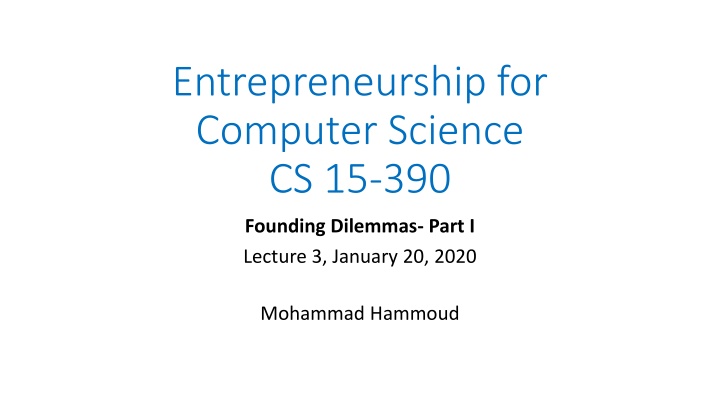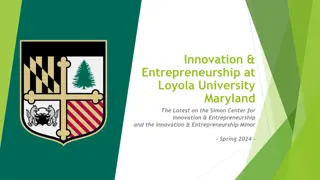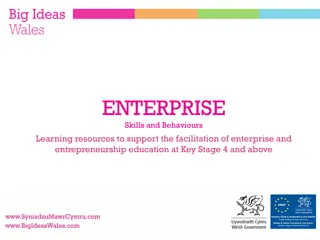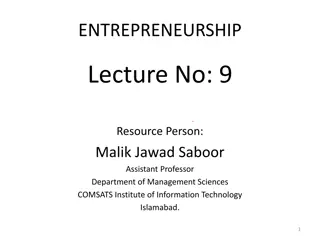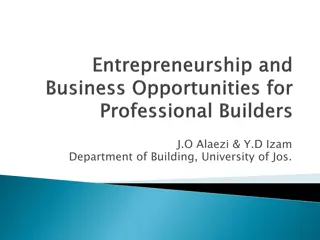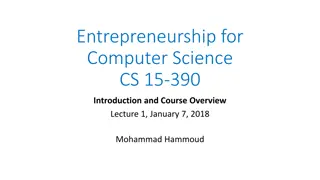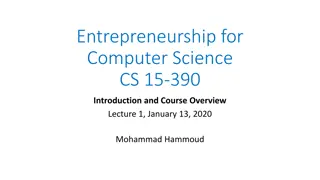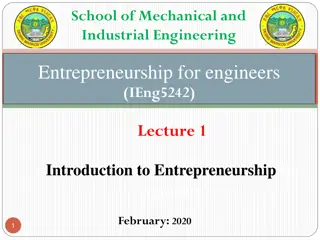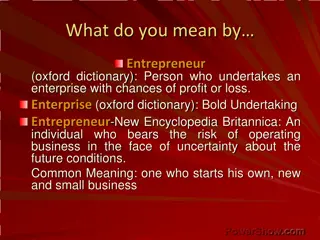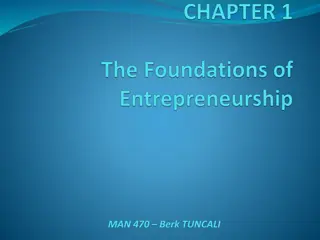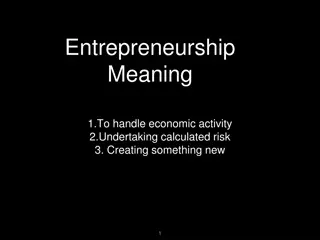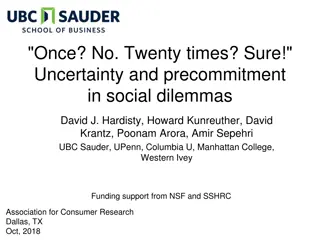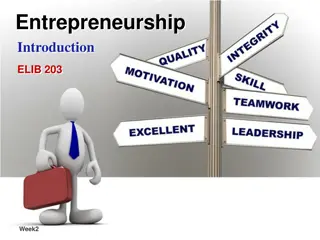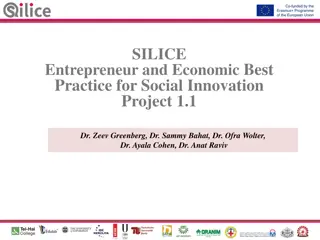Entrepreneurship Dilemmas and Starting a Company
Today's lecture focuses on the reality of startups and the importance of passion in entrepreneurship. The session explores why entrepreneurs found startups, emphasizing the challenges and mindset needed for success. A checklist is provided to assess readiness for starting a company, based on insightful studies from the founder's dilemmas book. Learn about the significance of passion and the journey ahead in building a successful startup.
Download Presentation

Please find below an Image/Link to download the presentation.
The content on the website is provided AS IS for your information and personal use only. It may not be sold, licensed, or shared on other websites without obtaining consent from the author.If you encounter any issues during the download, it is possible that the publisher has removed the file from their server.
You are allowed to download the files provided on this website for personal or commercial use, subject to the condition that they are used lawfully. All files are the property of their respective owners.
The content on the website is provided AS IS for your information and personal use only. It may not be sold, licensed, or shared on other websites without obtaining consent from the author.
E N D
Presentation Transcript
Entrepreneurship for Computer Science CS 15-390 Founding Dilemmas- Part I Lecture 3, January 20, 2020 Mohammad Hammoud
Today Last Session: Types of entrepreneurship More perspectives on entrepreneurship Today s Session: The reality of startups Should I found? Announcement: PS1 will be out by tonight. It is due on Thursday, January 30 by midnight
Passion: the Necessary but Not Sufficient Condition Starting a company is not easy- it is the exact opposite Without a passion you will not be able to keep going through good and tough times (which will certainly happen, without a question!) In fact, without passion you will never succeed in building a startup Distinguish yourself from entrepreneurial tourists or exploratory entrepreneurs who are interested in learning entrepreneurship, but are not ready for a difficult and humbling, yet promising journey
Passion Checklist I Understand That: Yes No 1 Founding a startup will be really, really hard and I still want to do it 2 It will be a lengthy process loaded with humiliating failures along the way, and I must learn from them and not take them personally 3 I cannot potentially do it alone 4 The path to success is not an algorithm with a set of rules to follow, but an iterative process where I can only increase or decrease the odds of success, but I cannot guarantee anything. Even if I achieve success, it is only temporary 5 The goal is to make an anti-fragile organization one that gets stronger over time when faced with problems, failures, uncertainty, and surprises 6 When others provide advice, I will listen, but I will also recognize that it is up to me to choose which advice to implement, and how to implement it, since only I own the final results and accountability 7 I will have to leave my comfort zone every day to grow and continue to be successful 8 I am doing this for more than the money. I believe in my cause and my team If you did not answer Yes to all of the above questions, you are probably not ready to start a company yet!
Why Entrepreneurs Found Startups? We answer this question and others using qualitative and quantitative studies from the founder s dilemmas book by Noam Wasserman Wasserman used surveys for 10 consecutive years from 2000 through 2009, creating a unique dataset that includes 9,900 founders- and more than 19,000 executives in total- from 3,607 startups
Motivations for Male Entrepreneurs Top four motivations for males in their 20s Rank Male Entrepreneurs in 20s (Rank for Male Non-Entrepreneurs) Male Non-entrepreneurs in 20s (Rank for Male Entrepreneurs) #1 Power & Influence (#10) Security (#13) #2 Autonomy (#13) Prestige (#6) #3 Managing People (#9) Financial Gain (#4) #4 Financial Gain (#3) Affiliation (#11)
Motivations for Female Entrepreneurs Top four motivations for females in their 20s Rank Female Entrepreneurs in 20s (Rank for Female Non-Entrepreneurs) Female Non-entrepreneurs in 20s (Rank for Female Entrepreneurs) #1 Autonomy (#12) Recognition (#10) #2 Power & Influence (#13) Affiliation (#12) #3 Managing People (#10) Security (#13) #4 Altruism (#5) Lifestyle (#11)
Motivations for Entrepreneurs Research shows that motivations for entrepreneurs remain relatively stable (but not for non-entrepreneurs) throughout life Two of the motivations (i.e., autonomy and power & influence) persist throughout the 20s, 30s, and 40s of male entrepreneurs, but in their 40s they also become motivated by altruism and variety Male entrepreneurs lag female entrepreneurs by a decade when it comes to prizing variety and by two decades when it comes to altruism!
The Reality of the Founding Process It is unfortunate but true, if entrepreneurship is a battle, most casualties stem from friendly fires or self-inflicted wounds The founding process is often chaotic and nonlinear, with founders improvising rather than following a script to build their startups Founding decisions need to be made by design and NOT by default In particular, founders need to see past their instincts and natural propensity for wishful thinking They need to expect the best, while preparing for the worst They need to make decisions strategically rather than reactively
Sequence of Founding Dilemmas YES NO Should I Found Now? Should I be a Solo Founder? Founding Team Dilemmas: Relationships? Roles? Rewards? NO YES Remain Non-founder Beyond-the-Team Dilemmas: Hires? Investors? Successions? At each fork in the road, the wrong decision can send the startup over a cliff or smother it in its cradle!
Should I Found Now? Research shows that stage of life does not seem to be a strong factor in starting one s own business (Noam Wasserman, the founder s dilemmas) Technology founders averaged 13.1 years of prior work experience and life sciences founders averaged 15.9 years A full 35% of founders had worked 20 years or more before founding, including 47% of life sciences founders A distinct subset founded with only 0 to 4 years of work experience Wait to found until Found early in career before golden handcuffs get too strong before family handcuffs get too strong before becoming too specialized build more human capital build more social capital build more financial capital Where is the sweet spot ?
To Locate Your Sweet Spot NO Remain Non-founder Should I Become a Founder? YES Dispassionate Evaluation of Idea? When Should I Found? Act to improve circumstances, then re-evaluate Evaluate other ideas Favorable Personal, Career, and Market Circumstances? NO NO YES Leap into Founderhood!
Locate Your Sweet Spot If you are at the intersection of these three circles , you should found! Relevant work experience & mental model Broad/deep work experience Low opportunity costs Change in golden handcuffs Fitness to found Favorable Career Circumstances Favorable Personal Circumstances Entrepreneurial motivations Supportive family situation Positive role models Cash cushion Favorable Market Circumstances Big opportunity Favorable context Customer willingness to pay Ticking clock
What If? Gray-Area Obstacles Potential Solutions for Getting to the Bull s Eye Top-down evaluation of potential markets, customers, and business models Find idea founder whose own holes match your strengths Participate in other startups Attend conferences and read journals and blogs in your area of interest/expertise I have everything but an idea Work more on your human, social, and financial capitals Find complementary cofounders, advisors, or mentors But I am not armed for battle yet Probe their fears and openly explore ways to address them Explore whether part-time founding is feasible But I am going to hurtmy family Save money to supply cash cushion and seed capital Maintain low personal burn rate Make the leap and do not wait for negative shocks to release handcuffs! My handcuffs have gotten too strong
What If? Gray-Area Obstacles Potential Solutions for Getting to the Bull s Eye Top-down evaluation of potential markets, customers, and business models Find idea founder whose own holes match your strengths Participate in other startups Attend conferences and read journals and blogs in your area of interest/expertise I have everything but an idea Work more on your human, social, and financial capitals Find complementary cofounders, advisors, or mentors But I am not armed for battle yet Probe their fears and openly explore ways to address them Explore whether part-time founding is feasible But I am going to hurtmy family Save money to supply cash cushion and seed capital Maintain low personal burn rate Make the leap and do not wait for negative shocks to release handcuffs! My handcuffs have gotten too strong
What If? Gray-Area Obstacles Potential Solutions for Getting to the Bull s Eye Top-down evaluation of potential markets, customers, and business models Find idea founder whose own holes match your strengths Participate in other startups Attend conferences and read journals and blogs in your area of interest/expertise I have everything but an idea Work more on your human, social, and financial capitals Find complementary cofounders, advisors, or mentors But I am not armed for battle yet Probe their fears and openly explore ways to address them Explore whether part-time founding is feasible But I am going to hurtmy family Save money to supply cash cushion and seed capital Maintain low personal burn rate Make the leap and do not wait for negative shocks to release handcuffs! My handcuffs have gotten too strong
What If? Gray-Area Obstacles Potential Solutions for Getting to the Bull s Eye Top-down evaluation of potential markets, customers, and business models Find idea founder whose own holes match your strengths Participate in other startups Attend conferences and read journals and blogs in your area of interest/expertise I have everything but an idea Work more on your human, social, and financial capitals Find complementary cofounders, advisors, or mentors But I am not armed for battle yet Probe their fears and openly explore ways to address them Explore whether part-time founding is feasible But I am going to hurtmy family Save money to supply cash cushion and seed capital Maintain low personal burn rate Make the leap and do not wait for negative shocks to release handcuffs! My handcuffs have gotten too strong
Sequence of Founding Dilemmas YES NO Should I Found Now? Should I be a Solo Founder? Founding Team Dilemmas: Relationships? Roles? Rewards? NO YES Remain Non-founder Beyond-the-Team Dilemmas: Hires? Investors? Successions?
Sizes of Founding Teams for Technology and Life Sciences Technology Life Sciences 45 39 40 34.8 35 29.1 % of Teams 30 25 21.9 20 17.5 15 12.2 11.7 11.7 8.4 10 5.5 5 2.1 1.5 0.6 0.6 0 1 2 3 4 5 6 7 Size of Founding Teams
Central Solo vs. Team Questions Decided to found Missing important human social, or financial capitals? YES NO Prefer to work alone? Become solo founder NO YES Need these capabilities at time of founding? YES Pursue confounder(s) NO Become solo founder; hire later
Solo vs. Team Dilemma Solo-found when Build a founding team when You have deep human and social capitals (and sufficient financial capital) that are relevant to the startup s industry You have critical holes in human, social, and/or financial capitals You prefer not to do some tasks required in the early days of the startup and favor a collaborative style You have a strong preference for maintaining full control of all decisions You have a strong desire for support or validation You do not have a strong need for support or validation The business is in a fast-moving industry, especially if there are first-mover advantages and network effects The business is small and in a slow-moving industry
Solo vs. Team Dilemma Solo-found when Build a founding team when You have deep human and social capitals (and sufficient financial capital) that are relevant to the startup s industry You have critical holes in human, social, and/or financial capitals You prefer not to do some tasks required in the early days of the startup and favor a collaborative style You have a strong preference for maintaining full control of all decisions You have a strong desire for support or validation You do not have a strong need for support or validation The business is in a fast-moving industry, especially if there are first-mover advantages and network effects The business is small and in a slow-moving industry
Solo vs. Team Dilemma Solo-found when Build a founding team when You have deep human and social capitals (and sufficient financial capital) that are relevant to the startup s industry You have critical holes in human, social, and/or financial capitals You prefer not to do some tasks required in the early days of the startup and favor a collaborative style You have a strong preference for maintaining full control of all decisions You have a strong desire for support or validation You do not have a strong need for support or validation The business is in a fast-moving industry, especially if there are first-mover advantages and network effects The business is small and in a slow-moving industry
Solo vs. Team Dilemma Solo-found when Build a founding team when You have deep human and social capitals (and sufficient financial capital) that are relevant to the startup s industry You have critical holes in human, social, and/or financial capitals You prefer not to do some tasks required in the early days of the startup and favor a collaborative style You have a strong preference for maintaining full control of all decisions You have a strong desire for support or validation You do not have a strong need for support or validation The business is in a fast-moving industry, especially if there are first-mover advantages and network effects The business is small and in a slow-moving industry
Solo vs. Team Dilemma Solo-found when Build a founding team when You have deep human and social capitals (and sufficient financial capital) that are relevant to the startup s industry You have critical holes in human, social, and/or financial capitals You prefer not to do some tasks required in the early days of the startup and favor a collaborative style You have a strong preference for maintaining full control of all decisions You have a strong desire for support or validation You do not have a strong need for support or validation The business is in a fast-moving industry, especially if there are first-mover advantages and network effects The business is small and in a slow-moving industry
Solo vs. Team Dilemma Solo-found when Build a founding team when You have deep human and social capitals (and sufficient financial capital) that are relevant to the startup s industry You have critical holes in human, social, and/or financial capitals You prefer not to do some tasks required in the early days of the startup and favor a collaborative style You have a strong preference for maintaining full control of all decisions You have a strong desire for support or validation You do not have a strong need for support or validation The business is in a fast-moving industry, especially if there are first-mover advantages and network effects The business is small and in a slow-moving industry
Solo vs. Team Dilemma Solo-found when Build a founding team when You have deep human and social capitals (and sufficient financial capital) that are relevant to the startup s industry You have critical holes in human, social, and/or financial capitals You prefer not to do some tasks required in the early days of the startup and favor a collaborative style You have a strong preference for maintaining full control of all decisions You have a strong desire for support or validation You do not have a strong need for support or validation The business is in a fast-moving industry, especially if there are first-mover advantages and network effects The business is small and in a slow-moving industry
Solo vs. Team Dilemma Solo-found when Build a founding team when You have deep human and social capitals (and sufficient financial capital) that are relevant to the startup s industry You have critical holes in human, social, and/or financial capitals You prefer not to do some tasks required in the early days of the startup and favor a collaborative style You have a strong preference for maintaining full control of all decisions You have a strong desire for support or validation You do not have a strong need for support or validation The business is in a fast-moving industry, especially if there are first-mover advantages and network effects The business is small and in a slow-moving industry
Sequence of Founding Dilemmas YES NO Should I Found Now? Should I be a Solo Founder? Founding Team Dilemmas: Relationships? Roles? Rewards? NO YES Remain Non-founder Beyond-the-Team Dilemmas: Hires? Investors? Successions?
Next Class Founding Team Dilemmas and Beyond
